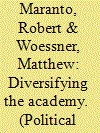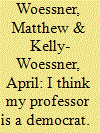|
|
|
Sort Order |
|
|
|
Items / Page
|
|
|
|
|
|
|
| Srl | Item |
| 1 |
ID:
117583


|
|
|
|
|
| Publication |
2012.
|
| Summary/Abstract |
Researchers have long recognized that higher education is dominated by professors whose politics are well to the left of the American political center. The cause and implications of this ideological imbalance have been intensely debated since the 1960s. Although critics of higher education, such as David Horowitz, argue that the political imbalance in academia is largely the result of ideological discrimination, emerging research on the views, values, and experiences of the professoriate tells a more complex story. Despite the relatively small numbers in the academy, the findings suggest that many conservative scholars can succeed in a predominantly liberal environment. Drawing on the latest research, as well as their own personal experience, the authors outline steps that conservative faculty can take to avoid needless political conflict and work happily in a profession largely dominated by the Left.
|
|
|
|
|
|
|
|
|
|
|
|
|
|
|
|
| 2 |
ID:
159527


|
|
|
|
|
| Summary/Abstract |
The presumption that rules and institutional structures profoundly influence an organization’s behavior is deeply rooted in the study of governance. Whereas social scientists have explored the link between institutional structure and political power at the national, state, and local level, there is virtually no quantitative research on how competing constitutional frameworks influence power in an academic setting. The researchers theorize that, given academics’ relatively limited input into institutional decision making, faculty respondents will perceive they have greater influence when they exercise direct control over faculty representatives. Merging a database of academic constitutions with faculty survey responses from the North American Academic Survey (NAAS), the authors find that, even when controlling for institutional size, budget, and academic mission, some features of academic constitutions are strongly correlated with perceptions of faculty power. In general, more representative constitutions are strongly associated with faculty influence. However, contrary to the underlying theory, faculty employed at schools where an administrator is designated as the chair or president of the academic senate feel they are more influential than those that elect their own leader. The results suggest a new and potentially important line of inquiry for political researchers.
|
|
|
|
|
|
|
|
|
|
|
|
|
|
|
|
| 3 |
ID:
092554


|
|
|
|
|
| Publication |
2009.
|
| Summary/Abstract |
Notwithstanding political science professors' concerted efforts to remain politically neutral in the classroom, we find evidence that students are able to successfully identify the partisan loyalties of their professors. Furthermore, we find that there is a tendency for students to drift toward the Democratic Party over the course of the semester, yet the direction of the shift appears to be unrelated to either the instructor's actual political loyalties, or to the student's perception of the professor's partisan preferences. Given that political science professors appear to exert no real influence on students' party loyalties, it is unclear whether efforts to diversify the field by hiring more Republican professors would actually reduce the "liberalizing" effects of higher education.
|
|
|
|
|
|
|
|
|
|
|
|
|
|
|
|
| 4 |
ID:
175297


|
|
|
|
|
| Summary/Abstract |
In considering the liberalizing effect of college on students’ political values, we argue that political identities—in the form of self-identified ideology or partisanship—are components of social identity and are resistant to change. Using data from the Higher Education Research Institute’s student surveys, we show that what movement in identity does occur is mostly a regression to the mean effect. On several issue positions, however, students move in a more uniform leftward direction. We find that liberal drift on issues is most common among students majoring in the arts and humanities. Self-reported ideology does drift left at liberal arts colleges, but this is explained by a peer effect: students at liberal arts colleges drift more to the left because they have more liberal peers. The results have implications for future research on college student political development, suggesting that attitudinal change can be more easily identified by examining shifts in policy preferences rather than changes in political identity.
|
|
|
|
|
|
|
|
|
|
|
|
|
|
|
|
|
|
|
|
|